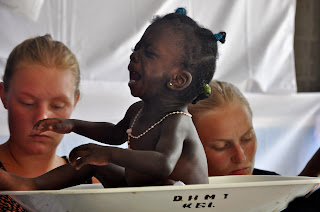Using the few minutes before breakfast for reflections. Spent more than an hour last night trying to figure out how to load photos onto this blog from an iPad. Very frustrating. But compare that to not having clean water. Photo-posting problems seem somehow more manageable.
Putting oneself in the position of villagers we've met, it's not hard to understand belief in miracles, or in God, or both. Think about living in an area so remote that you're an hour's walk from a dirt road that's probably not on Google Maps. Your village drinks ground water, which causes serious illnesses. You may well never have seen a white person before and, all of a sudden some appear from across the globe to build a well and bring you clean water, no strings attached. How else to explain this, but through the workings of some greater force?
And seeing the warm smiles on people's faces and their greeting of "you are welcome," welcome in the Biblical sense of greeting strangers, and feeling their gratitude is a great privilege and reward. As Peter said to us yesterday, their gifts to us of food and chickens are offerings of gratitude, not "payment" for what has been provided to them.
Experiencing this makes it tough to return completely to the cynical world we often inhabit back home.nnjust give me a bit of time, though.
We drove through heavy traffic to Dr. Annie's clinic in Kumasi. We chose to visit on one of the three days of the week that she runs the baby clinic, where mothers from all around the area bring their children.
The clinic is an inspired and inspiring beehive of activity, presided over by Dr. Annie.
Mothers and babies are registered, they wait in a crowed room for the babies to be weighed and checked. Two young Danish women serve as volunteers. Another area of the clinic grinds nutritional mixes of grains and nuts, which are fed to the babies. Still another room serves as a temporary resting place for mothers and babies during the first twelve hours of their lives, after which they must depart the clinic. An operating room for delivery of babies, which was financed by the Kipharts, stands nearby. Using the few minutes before breakfast for reflections. Spent more than an hour last night trying to figure out how to load photos onto this blog from an iPad. Very frustrating. But compare that to not having clean water. Photo-posting problems seem somehow more manageable.
From the clinic, we drive to the Kenilworth middle school in Krapa, stopping to pick up some postcards along the way. The school was created through a gift of the land by the local village and construction financed by the Kipharts (and members of The Kenilworth Union Church). A farm school was started at the school through the efforts of Joe and Ida Kwarteng. The ownership of the school, designed to be a middle school, was turned over by the Kipharts to the government.
There have been problems right along caused by divergent interests of the village, the gavernment and the professional staff of the school, augmented by poor communication and finger pointing between those parties and people who were assisting with the farm school. Thrown into the mix was Dr. Adai, a member of the board from the community and a confidant of both the local Nana/chief and the big Nana, in charge of many villages.
These differences came to a head at the meeting at the school that we attended, where the Nana, Sylvester (the secretary of the Board), the headmaster of the school and the Kipharts all epressed their views forcefully. The matter was left to further discussions between the parties, with Peter and Susie both expressing their hope and faith that all concerned would act in the interests of the intended beneficiary of all this, the children.
At one point at Krapa, I thought I had lost all of the pictures from my camera. It was NOT a pleasant half hour before I discovered that, in fact, I could retrieve them.
After, we went by Dr. Adai's new nursing, midwife and medical facility to discuss the situation at Krapa with the smart, but slippery Dr., who said he thought the matter could be worked out without confronting the parties. We'll see. The Kipharts have had it with Dr. Adai, and do not want to continue to be involved with him.
This all was most interesting, if a bit uncomfortable. It reinforced Susie's oft-expressed feeling that wells were easy, schools are not.
Back at the hotel for a brief respite before dinner. Today was MUCH less physically taxing than the previous days have been. Dinner was with a small group, including the delightful and irrepressible Dr. Annie. When she learned of difficulties with Dr. Adai, the first words from her mouth were, "I hope that you'll forgive him.". Dick said that they just didn't want to put yhemselves in the position of having to forgive him again. Annie saying that her Madagascar mother (she was born there) was 80% Jewish gave us a perfect entree into giving her a challah cover.
We discussed timing tomorrow and, at my urging, pushed up our departure time for Sefwi Wiawso, so as to give us more time for our visit there, before we depart for about a 5-hour drive from there to Cape Coast. We paid the hotel bill, and I gave Dick something towards the tip he is giving all of the Ghanaians who are accompanying us.
Each day is fascinating in its own way, and today was certainly no exception, nor, I believe, will tomorrow.







No comments:
Post a Comment